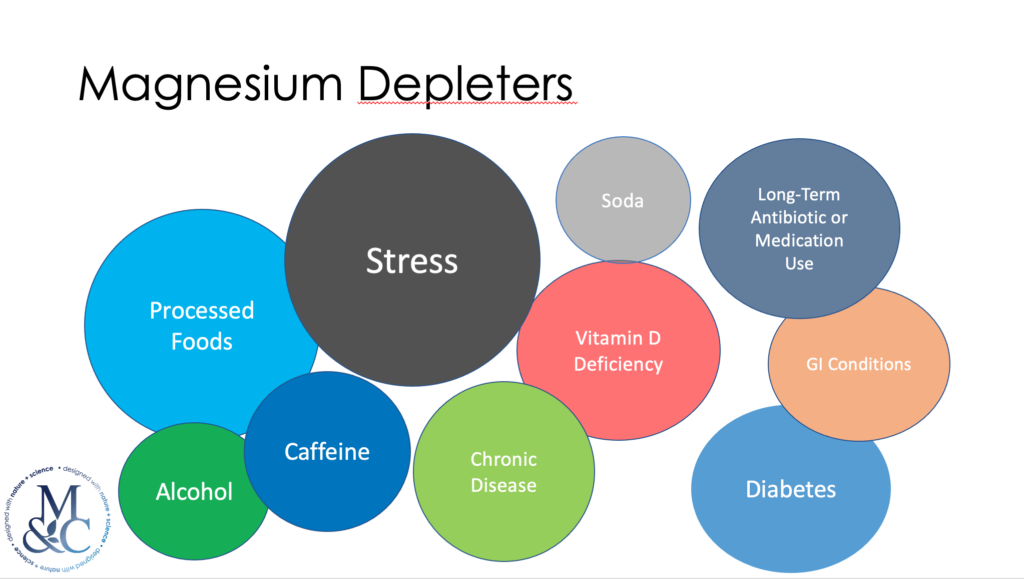
Chronic stress affects millions of child and adult North Americans across all walks of life, with profound implications for physical, mental, and emotional well-being. What if a Magnesium deficiency is exacerbating our stress levels, and can using Magnesium regularly help lower them?
Can Stress cause Magnesium deficiency, or does a deficiency cause Stress?
There is an overlap that suggests stress can increase Magnesium loss, causing a deficiency. A Magnesium deficiency could also enhance the body’s susceptibility to stress, resulting in a magnesium and stress vicious circle. We can replenish our Magnesium levels, to better handle stress, and prevent the kidneys from flushing Magnesium too early or too often.
Magnesium deficiency and its connection to stress
Along with the constant rushing and activity of modern life, stress has become an unwelcome companion for many of us. From work deadlines to personal challenges, stress can seem like an unavoidable part of our daily existence. However, what if there’s more to the story than meets the eye, and how can using topical Magnesium help to reduce our daily stress levels?
What is Magnesium?
Magnesium, often referred to as nature’s tranquilizer, is an essential mineral involved in over 300 biochemical reactions within the body. From regulating muscle and nerve function to supporting immune system health and bone strength, its role cannot be overstated. Yet, despite its importance, studies suggest that a significant portion of the population may be deficient in this vital nutrient. The chart above illustrates the many ways Magnesium is depleted from our bodies, with stress leading the pack.
Symptoms of Low Magnesium
The symptoms of magnesium deficiency can be subtle and easily overlooked, ranging from fatigue and muscle cramps to headaches and insomnia. However, one of the lesser-known consequences of inadequate magnesium levels is its impact on stress management.
When we’re under stress, our bodies undergo a series of physiological changes as part of the fight-or-flight response. This includes the release of stress hormones like cortisol and adrenaline, which prepare us to deal with perceived threats. While this response is essential for survival in acute situations, chronic stress can lead to dysregulation of these hormones, resulting in a cascade of negative effects on both our physical and mental well-being.

Chart Magnesium Depleters: Stress being the highest of all contributors. Mineral & Co.
How Magnesium Modulates Our Stress Response
Here’s where magnesium enters the picture: this mineral plays a crucial role in modulating the body’s stress response. It acts as a natural antagonist to the stress hormone cortisol, helping to regulate its release and promoting a sense of calm and relaxation. Additionally, magnesium is involved in the production of neurotransmitters like serotonin, which are essential for mood regulation.
So, what happens when we don’t get enough magnesium? Without an adequate supply of this mineral, our bodies may struggle to cope with stress effectively. Cortisol levels may remain elevated for more extended periods, contributing to feelings of anxiety and irritability. Furthermore, magnesium deficiency can impair neurotransmitter function, potentially exacerbating symptoms of depression and mood disorders.
The relationship between magnesium deficiency and stress is a complex interplay of biochemical processes, but the solution may be simpler than we think. By prioritizing magnesium-rich foods in our diets, such as leafy greens, nuts, seeds, and whole grains, we can ensure that our bodies have the necessary tools to combat stress effectively.
In addition to dietary sources, supplementation may be beneficial for those at risk of deficiency, such as individuals with certain medical conditions or those experiencing chronic stress.
Lifestyle and Magnesium for Stress
Besides using Magnesium butter for pain, lifestyle factors also play a significant role in magnesium status. Regular exercise, and stress management techniques such as mindfulness and meditation can all support healthy magnesium levels and improve our ability to cope with stress. Getting consistent sleep is critical to handling stress. Magnesium is a balm for adequate sleep, helping to lull us into deeper, more restful slumber.
In conclusion, while stress may seem like an inevitable part of modern life, it’s essential to consider the role that magnesium deficiency may play in exacerbating its effects. By prioritizing magnesium-rich foods, using our high-concentrate Magnesium lotions and whips, and adopting healthy lifestyle habits, we can support our bodies in managing stress more effectively and reclaim a sense of balance and well-being in our lives. After all, in the quest for peace of mind, sometimes the answers lie in the simplest of solutions. Mineral & Co’s Magnesium products can easily be applied for pain, fatigue, anxiety, sore muscles and sleep. There are no side effects as it bypasses the GI system.
From the pressures of work and finances to social relationships and health concerns, the sources of stress are diverse and multifaceted. Here’s a closer look at how chronic stress affects Americans —
Physical Health
Chronic stress takes a toll on the body, contributing to a range of health problems, making even everyday simple tasks challenging. It weakens the immune system, making individuals more susceptible to infections and illnesses. It can also exacerbate existing health conditions such as heart disease, diabetes, and gastrointestinal disorders. Moreover, prolonged stress increases inflammation in the body, which is linked to a host of chronic diseases.
Mental Health
The impact of chronic stress on mental health cannot be overstated. It is a significant risk factor for anxiety disorders, depression, and other mood disorders. Persistent stress can also impair cognitive function, leading to difficulties with concentration, memory, and decision-making. Over time, chronic stress can erode resilience and coping mechanisms, making it harder for individuals to manage life’s challenges effectively.
Emotional Well-being
Chronic stress can have profound effects on emotional well-being, leading to feelings of overwhelm, irritability, and burnout. It can strain relationships and diminish overall life satisfaction. Additionally, the constant activation of the body’s stress response can lead to emotional dysregulation, making it harder for individuals to regulate their emotions effectively.
Work Performance
In the workplace, chronic stress can hinder productivity, creativity, and job satisfaction. High levels of stress contribute to absenteeism, presenteeism (being present at work but not fully productive), and turnover. It can also create a toxic work environment, fostering tension and conflict among colleagues.
Financial Strain
Financial stress is a significant concern for many of us, particularly in the face of economic uncertainty, job instability, and mounting debt. Chronic financial stress can lead to sleep disturbances, anxiety, and depression. It may also impact decision-making, leading individuals to make choices that further exacerbate their financial woes.
Social Connections
Chronic stress can strain social relationships, leading to feelings of isolation and loneliness. It may cause individuals to withdraw from social activities and support networks, further exacerbating feelings of distress. Additionally, the impact of stress on mood and behavior can strain interpersonal dynamics, leading to conflict and misunderstanding.
Quality of Life
Ultimately, chronic stress diminishes overall quality of life, robbing individuals of joy, fulfillment, and a sense of purpose. It can create a cycle of negativity and hopelessness, making it challenging to envision a brighter future. Left unaddressed, chronic stress can have long-term consequences for physical and mental health, as well as overall life satisfaction.
Long-Term Impact of Chronic Stress
Chronic stress is a pervasive issue affecting Americans across all aspects of life. From its impact on physical health and mental well-being to its effects on work performance, relationships, and quality of life, the consequences of chronic stress are far-reaching and profound.
Addressing chronic stress requires a multifaceted approach, including lifestyle changes, stress management techniques, and access to supportive resources and services. By prioritizing self-care and seeking support when needed, individuals can mitigate the negative effects of chronic stress and reclaim a sense of balance and well-being in their lives. This article describes effective techniques to manage stress.
7 Quick Ways Topical Magnesium Helps to Reduce the Stress of Muscle Pain
- Apply Magnesium lotion for pain from restless leg syndrome
- Use topical Magnesium for muscle pain into shoulders & neck
- Rub in Magnesium butter for headache pain onto forehead
- Integrate use of organic Magnesium cream daily on bottoms of feet
- Use Magnesium for pain relief on lower back
- Utilize Magnesium for muscle fatigue after exercising
- Apply Magnesium for sore muscles from sitting for long periods of time
Want to learn more? This article provides more detail on the connection between low Magnesium levels and stress.